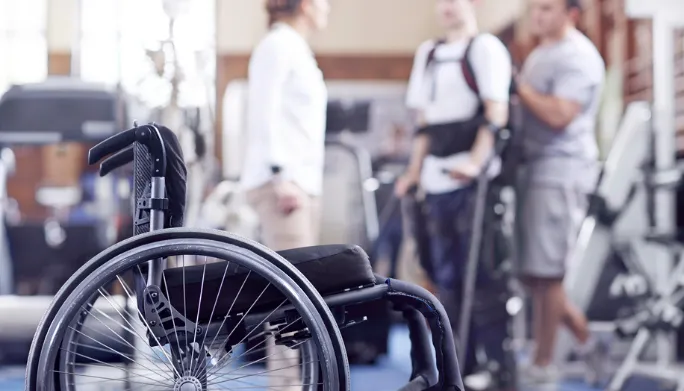Spinal Cord Injuries (SCIs)

Understanding and Confronting Spinal Cord Injuries
Spinal Cord Injuries (SCIs) are more than medical conditions; they are life-altering events that reshape one’s existence. These injuries, often sudden and unexpected, challenge individuals to adapt to new realities. While the initial shock can be overwhelming, understanding the nature of SCIs and their implications is the first step toward effective management. The journey following an SCI is marked by resilience and a redefinition of personal limits. It is a path lined with challenges, but also with opportunities for growth and rediscovery. This is where the importance of a supportive and informed approach to care, particularly through occupational therapy, becomes clear, offering a beacon of hope in navigating this uncharted territory.
The Spinal Cord’s Role and the Impact of Injury
The spinal cord is not just a conduit for neural messages; it’s the core of our physical functionality. Its integrity is crucial for maintaining movement, sensation, and various bodily controls. When an SCI occurs, the consequences can be drastic, ranging from partial to complete loss of function below the injury site. The severity of these impacts varies widely, but each case of SCI fundamentally changes a person’s interaction with the world around them. It’s a disruption that calls for significant adjustments in lifestyle, medical care, and personal outlook. Understanding the spinal cord’s critical role highlights the profound nature of these injuries and underscores the necessity for comprehensive rehabilitation strategies.
Occupational Therapy: A Cornerstone in SCI Recovery
Occupational therapy (OT) stands out in SCI rehabilitation. Focused on enhancing daily life skills, OT practitioners empower individuals to navigate new life challenges post-injury.
Individualized Assessment and Goal Setting: Tailoring rehabilitation plans to each person’s needs and aspirations, OTs set the stage for effective recovery.
Skill Relearning and Task Adaptation: OTs guide patients in reacquiring everyday skills, employing new methods and adaptations for increased mobility and independence.
Utilizing Assistive Technology: Proficient in recommending and training in assistive devices, OTs help patients regain autonomy in their daily lives.
Home and Workplace Modifications: Advising on environmental alterations, OTs enhance safety and accessibility, making living and working spaces more conducive to the patient’s new needs.
Integrating Strength and Mobility: Collaborating with physical therapists, OTs incorporate physical rehabilitation into daily activities to boost overall functionality.
Emotional Support and Coping Strategies: Addressing the psychological challenges of living with an SCI, OTs offer emotional support and practical coping mechanisms.
Community Reintegration: OTs play a crucial role in helping patients reengage with community life, from transportation to social participation.
Educational and Advocacy Efforts: In educating patients and their networks, OTs foster understanding and advocate for necessary resources and support.
The Far-reaching Impact of Occupational Therapy in SCI
Occupational therapy in the context of SCI is transformative, extending far beyond the confines of traditional medical interventions. It addresses the holistic needs of individuals, taking into account their physical, emotional, and social well-being. This therapy goes beyond just aiding physical recovery; it touches every aspect of life post-injury. From enabling individuals to perform basic self-care activities to facilitating their return to work or hobbies, occupational therapy is instrumental in rebuilding a sense of normalcy and purpose. It empowers those affected by SCI to reclaim control over their lives, fostering independence and confidence. The therapy’s impact is not just measured in physical improvements, but in smiles regained, hobbies revisited, and life’s roles joyfully embraced once again.
Redefining Life with SCI Through Occupational Therapy
Living with a Spinal Cord Injury (SCI) is undeniably challenging, yet it’s a journey filled with possibilities for renewal and growth. Occupational therapy plays a critical role in this transformative process. It’s not just about adapting to a new way of life; it’s about redefining what life can be post-injury. This therapy empowers individuals to look beyond their physical limitations, encouraging them to explore new interests, engage in meaningful activities, and reconnect with their community and loved ones in enriching ways.
Occupational therapy is a partnership – one that respects individual needs and aspirations. It’s a collaboration that involves setting achievable goals, celebrating progress, and constantly adapting to the evolving needs of each person. The ultimate aim is not just to cope with the new realities of SCI but to thrive within them. It’s about crafting a life that’s not defined by limitations but illuminated by the possibilities and opportunities that lie ahead.
If you or someone you know is facing the challenges of a spinal cord injury, remember that you are not alone. Our team of dedicated occupational therapists is here to support you every step of the way. We invite you to reach out to us, to learn more about how occupational therapy can play a pivotal role in your recovery journey. Let us help you redefine your life with SCI, finding new paths to independence and fulfillment.
Contact Us Today to Begin Your Journey of Transformation and Empowerment with Occupational Therapy.
Embrace this opportunity to reshape your life. With the right support and guidance, a fulfilling and independent life is not just a dream – it can be your reality. Let us be part of your journey towards rediscovering your strengths and redefining your capabilities. Reach out now, and take the first step towards a new chapter in your life with SCI.


